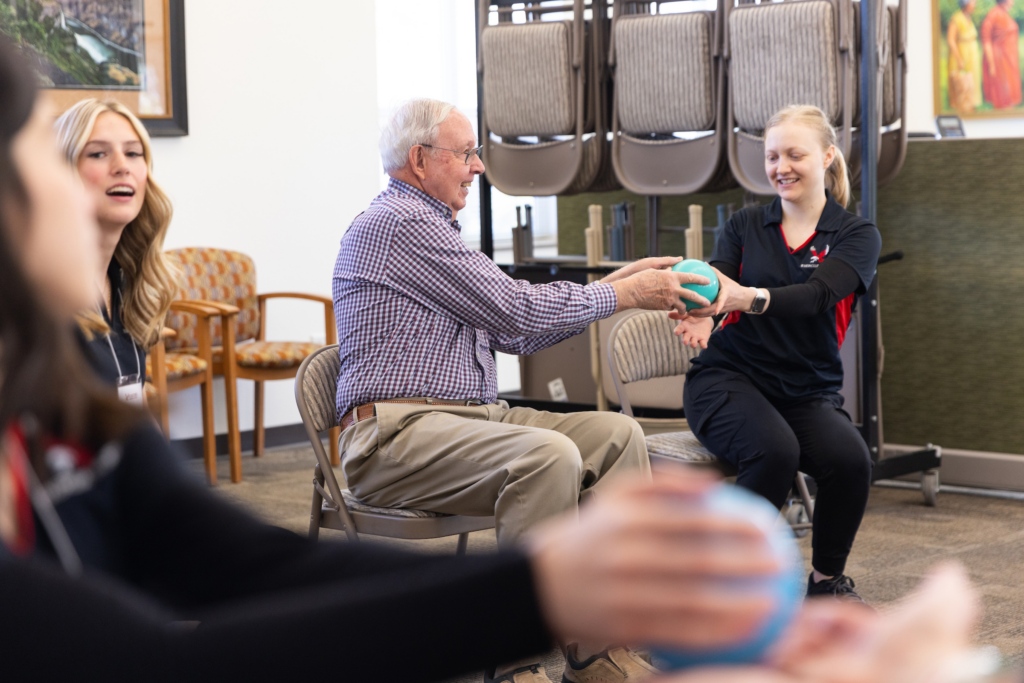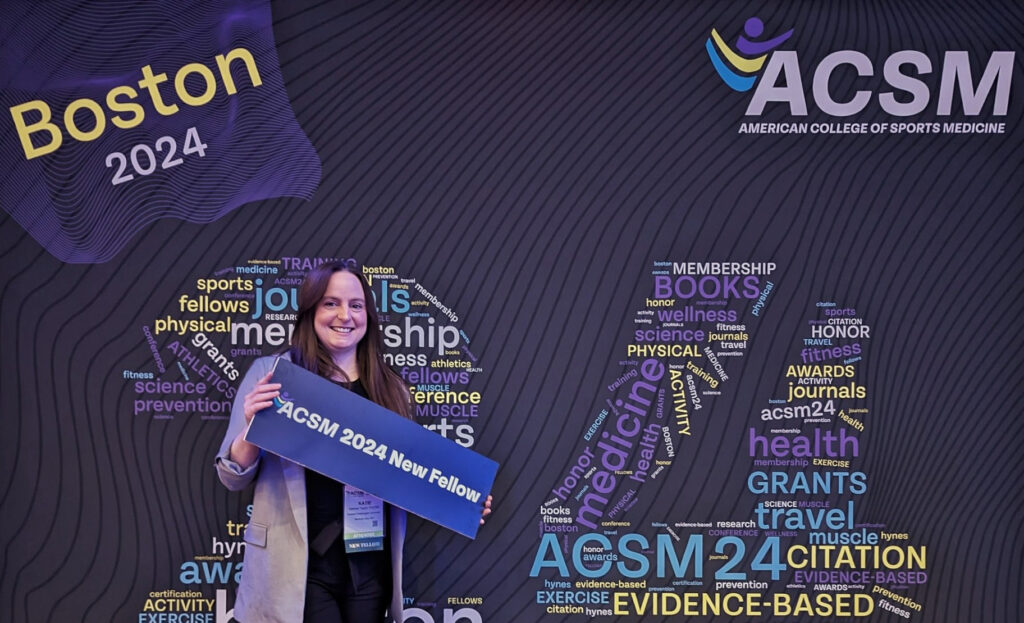Exercise Science Major, Bachelor of Science (BS)
The Bachelor of Science in Exercise Science offers four tracks and prepares students to work in a variety of health, fitness, wellness, and sports performance environments. Our exercise science track prepares students to work with a range of populations including the general population (i.e., apparently healthy) in commercial fitness and corporate wellness centers, populations with chronic diseases in clinical facilities, and athletes in sports performance settings. The BS in Exercise Science was accredited by the Committee on Accreditation for the Exercise Sciences (CoAES) in June 2024.
Our pre-professional tracks prepare students to apply to graduate programs in allied health care. While our pre-professional tracks are specific to athletic training, occupational therapy, and physical therapy, an increasing number of students use the extensive science requirements to prepare for applications to other programs in allied health care including chiropractic, nursing, and physician’s assistant. The degree also lays a strong foundation for graduate degrees in kinesiology and related fields. The course work prepares students to pursue certifications from esteemed organizations in the industry including American College of Sports Medicine (ACSM), National Strength and Conditioning Association (NSCA), National Academy of Sports Medicine (NASM), and the American Council on Exercise (ACE).
You can declare your major in Exercise Science online today!
Major Declaration Form
| INTRODUCTION TO EXERCISE SCIENCE | 1 |
| PRINCIPLES OF PROGRAM DESIGN | 3 |
| PRINCIPLES OF PROGRAM DESIGN FOR SPECIAL POPULATIONS | 4 |
| EXERCISE COUNSELING AND BEHAVIOR CHANGE | 3 |
| PHYSIOLOGY OF EXERCISE | 4 |
| STANDARD FIRST AID AND SAFETY | 2 |
& | FUNCTIONAL ANATOMY
and FUNCTIONAL ANATOMY LAB | 4 |
& | EXERCISE TESTING AND PRESCRIPTION
and EXERCISE TESTING AND PRESCRIPTION LAB | 4 |
& | BIOMECHANICS
and BIOMECHANICS LAB | 4 |
| HEALTH FITNESS MANAGEMENT | 3 |
| APPLIED NUTRITION AND PHYSICAL FITNESS | 3 |
| |
| |
&
&
&
&
&
| HUMAN ANATOMY AND PHYSIOLOGY NON-BIOL MAJORS
and HUMAN ANATOMY AND PHYSIOLOGY NON-BIOL MAJORS LAB
and HUMAN ANATOMY AND PHYSIOLOGY NON-BIOL MAJORS
and HUMAN ANATOMY AND PHYSIOLOGY NON-BIOL MAJORS LAB
and HUMAN ANATOMY AND PHYSIOLOGY NON-BIOL MAJORS
and HUMAN ANATOMY AND PHYSIOLOGY NON-BIOL MAJORS LAB | |
&
&
&
&
&
| GENERAL CHEMISTRY FOR THE HEALTH SCIENCES
and GENERAL CHEMISTRY LABORATORY FOR THE HEALTH SCIENCES
and ORGANIC CHEMISTRY FOR THE HEALTH SCIENCES
and ORGANIC CHEMISTRY LABORATORY FOR THE HEALTH SCIENCES
and BIOCHEMISTRY FOR THE HEALTH SCIENCES
and BIOCHEMISTRY LAB FOR THE HEALTH SCIENCES | |
| |
| |
| STATISTICS FOR THE SOCIAL SCIENCES | |
| ELEMENTARY PROBABILITY AND STATISTICS | |
| PSYCHOLOGICAL STATISTICS | |
| CARE AND PREVENTION OF INJURIES | |
| NUTRITION IN SPORT AND EXERCISE | |
| PHYSICAL ACTIVITY, MENTAL HEALTH, AND COGNITION | |
| CLINICAL BIOMECHANICS | |
| RESEARCH AND ANALYSIS | |
| ELECTROCARDIOLOGY INTERPRET | |
| GROUP EXERCISE INSTRUCTOR TRAINING | |
| STRENGTH AND CONDITIONING PROLAB | |
| PROFESSIONAL INTERNSHIP (variable credit course–must complete 15 credits–minimum grade ≥B) | |
| EXERCISE SCIENCE PRACTICUM (must complete 100 hours with Certified Athletic Trainer–must complete 8 credits–minimum grade ≥B required) | |
| MEDICAL TERMINOLOGY (minimum grade ≥B required) | |
&
| INTRODUCTORY PHYSICS I
and MECHANICS LABORATORY | |
or | PHYSICAL SCIENCE I |
| ABNORMAL PSYCHOLOGY (minimum grade ≥B required) | |
| EXERCISE SCIENCE PRACTICUM (must complete 8 credits–minimum grade ≥B required) | |
| INTRODUCTION TO OCCUPATIONAL THERAPY (minimum grade ≥B required) | |
| GENERAL PSYCHOLOGY | |
| LIFE-SPAN DEVELOPMENT (minimum grade ≥B required) | |
| ABNORMAL PSYCHOLOGY (minimum grade ≥B required) | |
| EXERCISE SCIENCE PRACTICUM (must complete 8 credits–minimum grade ≥B required) | |
| |
| INTRODUCTORY PHYSICS I | |
| INTRODUCTORY PHYSICS II | |
| INTRODUCTORY PHYSICS III | |
| MECHANICS LABORATORY | |
| HEAT AND OPTICS LABORATORY | |
| ELECTRONICS LABORATORY I | |
| ABNORMAL PSYCHOLOGY | |
| SENIOR CAPSTONE IN EXERCISE SCIENCE (minimum grade ≥C+) | 4 |
| Total Credits | 96-111 |
The following plan of study is for a student with zero credits. Individual students may have different factors such as: credit through transfer work, Advanced Placement, Running Start, or any other type of college-level coursework that requires an individual plan.
Courses could be offered in different terms, checking the academic schedule is paramount in keeping an individual plan current. Students should connect with an advisor to ensure they are on track to graduate.
All Undergraduate students are required to meet the Undergraduate Degree Requirements.
| First Year |
|---|
| Fall Quarter | Credits | Winter Quarter | Credits | Spring Quarter | Credits |
|---|
& (Natural Science BACR 1) | 5 |
& (Natural Science BACR 2) | 5 |
& | 5 |
| 5 | , , or | 5 | Humanities & Arts BACR 11 | 5 |
| 5 | | 5 | Social Science BACR 11 | 5 |
| | 15 | | 15 | | 15 |
| Second Year |
|---|
| Fall Quarter | Credits | Winter Quarter | Credits | Spring Quarter | Credits |
|---|
& | 5 |
& | 5 |
& | 5 |
| 1 | Diversity - graduation requirement1 | 5 |
& | 4 |
| Humanities & Arts BACR 21 | 5 | Global Studies - graduation requirement1 | 5 | | 3 |
| Social Science BACR 21 | 5 | | Elective - minor or general elective | 5 |
| | 16 | | 15 | | 17 |
| Third Year |
|---|
| Fall Quarter | Credits | Winter Quarter | Credits | Spring Quarter | Credits |
|---|
& | 4 | | 3 | | 4 |
& | 4 | | 2 | | 3 |
| Exercise Science Elective2 | 3 | | 3 | Exercise Science Elective2 | 3 |
| Elective - minor or general elective | 4 | Exercise Science Elective2 | 3 | Elective - minor or general elective | 5 |
| | Elective - minor or general elective | 1 | |
| | 15 | | 12 | | 15 |
| Fourth Year |
|---|
| Fall Quarter | Credits | Winter Quarter | Credits | Spring Quarter | Credits |
|---|
| 3 | | 4 | | 5 |
| 5 | | 5 | (Senior Capstone - graduation requirement) | 4 |
| Elective - minor or general elective | 5 | Elective - minor or general elective | 5 | Elective - minor or general elective | 5 |
| Elective - minor or general elective | 4 | | |
| | 17 | | 14 | | 14 |
| Total Credits 180 |
Students who earn a BS in Exercise Science from EWU should be able to:
- demonstrate competence in first aid response to emergency situations;
- explain core principles of nutrition for health;
- identify musculoskeletal structures that enable human movement;
- apply the principles of biomechanics to assess human movement;
- assess health-related components of fitness for apparently healthy adults in accordance with all ACSM guidelines;
- analyze health-related fitness assessments for apparently healthy adults;
- design an exercise prescription to enhance health-related components of fitness;
- apply principles of exercise management for persons with controlled disease;
- explain physiological responses to exercise;
- explain theories of behavior change;
- identify an exercise professional's scope of practice;
- demonstrate competence as an entry-level Exercise Science professional in the cognitive learning domain, in accordance with the Committee on Accreditation for the Exercise Sciences;
- demonstrate competence as an entry-level Exercise Science professional in the psychomotor learning domain, in accordance with the Committee on Accreditation for the Exercise Sciences;
- demonstrate competence as an entry-level Exercise Science professional in the affective learning domain, in accordance with the Committee on Accreditation for the Exercise Sciences.



